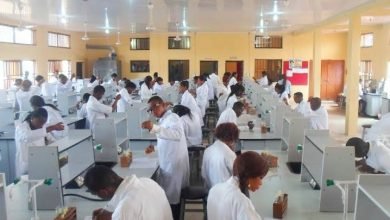Ibadan Poly School Fees for Non-Indigenes (2024)
Ibadan Poly School Fees for Non-Indigenes (2024)
Contents
Choosing Ibadan Poly as a non-indigene can unlock exciting academic possibilities.
This guide provides a detailed breakdown of the associated costs, empowering you to embark on your academic journey with confidence.
Understanding the Fee Structure:
The Ibadan Poly school fees for non-indigenes (2024) encompass both mandatory and optional charges. Here’s a breakdown of the key components:
-
Tuition fees: This forms the major expense and varies depending on the chosen program and year of study.
-
Acceptance fee: A one-time payment securing your place as a student of Ibadan Poly.
-
Development levy: Contributes to the institution’s infrastructure development and advancement initiatives.
-
Student ID Card: Provides access to campus facilities and resources.
-
Medical examination fee: Covers the cost of a mandatory medical examination.
-
Matriculation gown fee: Applicable only for first-year students.
-
Caution deposit (refundable): A deposit to cover potential damages or missing items, refundable upon graduation or withdrawal.
Program-Specific Fees:
While the core fee structure remains consistent across departments, Ibadan Poly school fees for non-indigenes (2024)can vary depending on the chosen program. Factors such as program duration, specialized resources, and practical training components can influence the overall cost.
Additional Fees:
-
Examination fees: Covers the administration and conduct of examinations.
-
Library services: Grants access to the library’s valuable resources and technology.
-
ICT charges/internet charges: Facilitates access to internet and technology resources essential for academic research and online learning.
-
Student union dues: Supports the activities and initiatives of the student union.
-
Sports/games: Contributes to sporting activities and facilities.
-
Faculty charges: Supports faculty-specific activities and resources related to your program.
-
Departmental charges: Contributes to the functioning of your chosen department and its specialized resources.
-
Student affairs charges: Provides support services and activities for students, including career counseling and academic advising.
Optional Fees:
-
Hostel accommodation fee: Covers the cost of on-campus housing.
-
Examination retake fees: Applicable for retaking failed examinations.
-
Transcript processing fee: Incurred when requesting official academic transcripts.
-
Extracurricular activities: Participation in various clubs and societies related to your interests.
Understanding the Difference:
Non-indigenes attending Ibadan Poly incur additional fees compared to indigenous students. This difference is typically reflected in the tuition fees, which can be significantly higher for non-indigenes.
Exploring Financial Assistance:
Ibadan Poly recognizes the financial burden faced by non-indigenous students and offers various financial aid options:
-
Scholarships: Awarded based on academic merit, need, or specific criteria related to your program. These scholarships may offer partial or full tuition coverage.
-
Grants: Need-based financial assistance provided to eligible students.
-
Work-study programs: Opportunities to earn income while contributing to the institution’s operations.
-
Loan schemes: Long-term loans to cover tuition fees and other associated expenses.
For detailed information about available financial aid options, eligibility criteria, and application procedures, visit the Ibadan Poly website or contact the financial aid office directly.
Planning for Additional Expenses:
Beyond the Ibadan Poly school fees for non-indigenes (2024), consider potential additional expenses:
-
Personal expenses: Food, housing (if not using on-campus facilities), transportation, and other personal needs.
-
Books and stationery: Required textbooks, reference materials, and other academic supplies specific to your program.
-
Travel expenses: Costs associated with traveling to and from the Ibadan Poly campus for academic and personal purposes.
-
Medical expenses: Any additional medical needs beyond the covered services.






